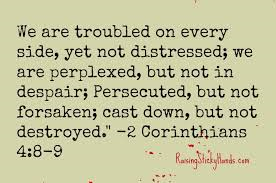

Not that I have already obtained all this, or have already arrived at my goal, but I press on to take hold of that for which Christ Jesus took hold of me. Brothers and sisters, I do not consider myself yet to have taken hold of it. But 1 thing I do: Forgetting what is behind and straining toward what is ahead, I press on toward the goal to win the prize for which God has called me Heavenward in Jesus (Phil.3:12-14).
How can I do it? How do I leave behind my past failures where I’ve let others down? How do I overcome the sins of my past? How do I live beyond the grievous wounds left by those intent on hurting me? How do I let go of past ugliness targeted at me, malicious gossip about me, and intentional sins intended to hurt me?
The fatalistic response is sad, “You don’t!”
The flippant response is as simple as it is sarcastic, “How can you not?”
There is truth in this flippant response because if we don’t get past all that stuff from the past we won’t ever get anywhere with our future. There is truth in the fatalistic response because getting beyond our past is very hard for some of us. The sad truth is that so many of us live in the past. We replay past events and ask, “Why did they do this to me?” Or we try to replay the past to figure out what we could’ve done better: “I wonder what would have happened if I had done things differently?” Or worse, we replay the past and play the “if only” game: “I wonder where I’d be today ‘if only’ that hadn’t happened to me?” Or we blame God: “Where was God when this happened? Why did he let this happen to me?”
Too many of us are lost to the future because we cannot let go of something in our past. We allow past rejections to mock us. We allow past failures, betrayals, or wounds to mark our future calendars with built-in melancholy. How do we prevent our past from destroying our future and infecting our present?
Few could rival the apostle Paul for reasons to have regrets. He had persecuted the church, presided over the stoning of Stephen, and dedicated his time and his talents to chasing down Christians to throw them into jail and torture. He was, in his own words, “the worst of sinners” (1 Timothy 1:15-16). He had spent his time getting the highest degree for a Jewish rabbi being educated at the feet of Gamaliel, the greatest of rabbis of his time, or so he thought until he truly met Jesus (Acts 22:3-5). Yet Paul left all of that Jewish achievement behind to become the powerful proclaimer of Jesus to non-Jews all over the Roman Empire. Paul could have focused on those first thirty years of his life as wasted. He even said he considered all that he had achieved as dung, refuse, and garbage compared to knowing Jesus (Philippians 3:1-9). But Paul did not dwell in his past. So how did he do it?
Paul gives us three key phrases to show us how he left his past in the past:
Forgetting what is behind…
Straining toward what is ahead…
Pressing on toward the goal…
Let’s look at each of these three briefly to see if we can get some traction to help us in our struggle to keep the past in the past:
Forgetting what is behind…
Forgetting is hard. Most folks who talk with me come wanting to know how to forget what is behind them. They say they can’t forget. They tell me all the way’s they’ve tried to forget. So what did Paul mean when he said to forget?
Paul didn’t mean these things never crossed his mind. Paul refers to some of these past problems several times in his letters. He reconciles with folks who had failed him in the past, and he includes them in ministry with him again — for example John Mark. However, Paul didn’t let these past things dominate his thoughts, which we will see in the next two strategies of moving beyond the past.
We don’t forget what we keep as our primary focus. We don’t forget what we try to forget. If I kept reminding you to quit thinking about my pink tie with orange polka dots as I spoke to you, then you would not be able to think of anything else but that ugly tie. We can acknowledge our thought about a past event, but we intentionally have to remind ourselves, “I’m not going to let this thought dominate my mind or my heart. I will focus on something else.” Then shift our focus. Our minds need to engage purposefully in some other focus if it is going to let go of our destructive focus. We can get better at this with practice, but catching ourselves and intentionally focusing on something else, with the Spirit’s help, is really the only way to let go of that unwanted thought. Which brings us to…
 Straining toward what is ahead…
Straining toward what is ahead…
Paul redirected his focus by moving forward with the work he had at hand. This task could be his daily prayers for churches and church members all over the world as he prayed for them by name. It could have been on his work as a leatherworker and tent maker. It could have been his mentoring of Timothy, Titus, or Silas. It could have been on his letters that he wrote to churches and other believers. Paul had work to do. It was strenuous work. Paul did what was in front of him to do as he also moved in the direction of God’s call and his goals for his life.
Getting ourselves busy doing what we need to do is crucial. Whatever is needed to get us to the next stage of life, job, family, personal growth, professional achievement, or spiritual involvement needs to be done immediately. As we do this, we need to stop the negative self-talk we bring to our work from the past. “You will never amount to anything” “They won’t listen.” “This is wasted effort.” “You will never get this done.” These self-fulfilling prophecies doom us and keep us in the failures of the past. So we have to confront these wrong statements with two actions — not just thoughts.
Our first action is to confront these self-destructive thoughts. Just because we thought them doesn’t mean they are true and that we have to listen to them. I have found that for me, and for others with this problem, going to a mirror and talking to ourselves out loud can be powerfully effective. That message might be something like this:
“Phil, you may feel this is true, but it is not true. This problem is the devil trying to keep you mired in the past. Work hard. Offer it to the Lord. Trust he will help you move to a better place. Don’t go back there because the Lord is calling you forward!”
The second action is to get busy doing hard work. Sometimes we can throw our own pity party about the past to help us procrastinate from doing a job we don’t want to do. So by intentionally asking the Lord to help us be effective as we apply ourselves to the job at hand helps us get that job done, gain momentum, and help us move forward. But, that doesn’t mean it is easy. That is why Paul used the word, “straining” and our next key strategy, which begins with the word “pressing”.
Pressing on toward the goal…
Paul’s final focus to move beyond his past is tied to his sense of being called by God for a specific purpose. This effort is a little harder for some folks than others because they are not sure of their calling… or even if they have a calling. Please know this: God has something planned for each of us to accomplish (Ephesians 2:10). We are called to fulfill that purpose (Romans 8:28). He has gifted each of us so that we can live out that purpose (1 Peter 4:10-11). So if you have not done so, ask God to help you identify what he has in mind for you to do with your life. Ask a spiritual friend, mentor, or minister to help you invest yourself in several things until your goal in life is clear. Once you’ve identified that, pursue it.
Any time that the devil drags you back into the past — mistakes, failures, successes, sins, victories — purposely go work on your goal for God. Work hard at it. Set some other things aside. A life-goal is hard work whether it involves passing on faith to children or reaching a place of greater spiritual influence in the lives of others. So press on to accomplish that goal. Recognize delays, defeats, setbacks, and disappoints as part of the spiritual warfare that is taking place to prevent you from getting to God’s goal. Keep pressing on to that goal. Paul put it this way:
I consider my life worth nothing to me; my only aim is to finish the race and complete the task the Lord Jesus has given me… (Acts 20:24).
We are not going to arrive fully at the person or place we want to be in this life. It’s about the journey. But if we keep forgetting what is behind and keep straining toward what is ahead and keep pressing on to our goal, then the past won’t hold us. Life has too much ahead of us to ruin it by dragging our past into our future!















